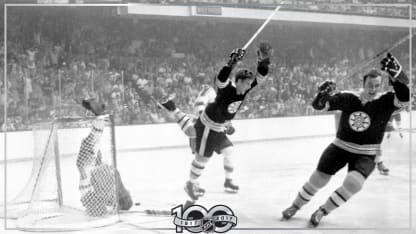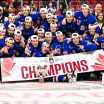The only ones not interested in this scenario were the Blues. St. Louis led 2-1 in the second period and 3-2 well into the third before forward Johnny Bucyk scored for the Bruins at 13:28 to force overtime.
"It was off to overtime, which is the way every kid wants to win the Cup," Orr wrote. "No one needed a speech in the dressing room to get motivated to go back out there. Not much was said. At least I never heard much. I suppose nothing really needed to be said. We all knew what was at stake."
Coach Harry Sinden started overtime with his best defense pair, Orr and Don Awrey, playing behind Boston's third line: Derek Sanderson between Wayne Carleton on the left and Ed Westfall on the right.
It turned out to be the perfect combination. Sanderson's missed shot came to Orr along the right-side boards. He slid the puck to Sanderson behind the net and cut for the front to get Sanderson's return pass and found himself alone with Blues goaltender Glenn Hall.
\[RELATED: Glenn Hall embraces allowing 'The Goal' to Bobby Orr\]
The call by famed announcer Dan Kelly on CBS is perfect in its simplicity.
"Orr … behind the net to Sanderson … to Orr … Bobby Orr ... scores, and the Boston Bruins win the Stanley Cup."
The goal was equally simple.
"Derek gave me a great pass and when I got the pass I was moving across," Orr told author Andrew Podnieks for "The Goal: Bobby Orr and the Most Famous Shot in Stanley Cup History."
"As I skated across, Glenn had to move across the crease and had to open his pads a little. I was really trying to get the puck on net, and I did. As I went across, Glenn's legs opened, so I jumped."
Blues defenseman Noel Picard, desperate to stop Orr, got his stick under his skate. But Picard was an instant too late: 40 seconds into overtime, the Bruins were champions for the first time in 29 years. Instead of stopping Orr, Picard's stick lifted Orr to the point that some angles show his legs higher than the crossbar.
"He brought me down," Orr wrote in his autobiography, "but not before I'd spent that moment airborne. And as soon as I fell back to the ice, Sanderson jumped on me, and the celebrations began."


















